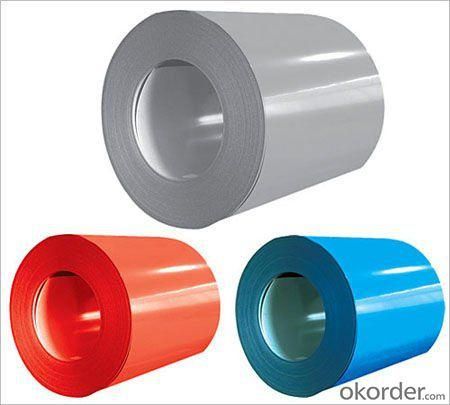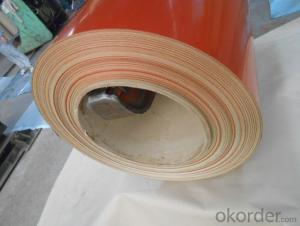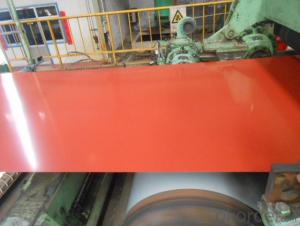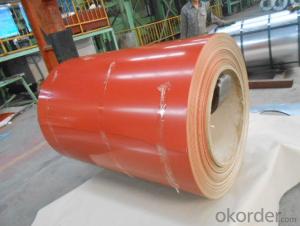Pre-Painted Galvanized Steel Coil with Red Color
- Loading Port:
- Shanghai
- Payment Terms:
- TT OR LC
- Min Order Qty:
- 100 m.t.
- Supply Capability:
- 20000 m.t./month
OKorder Service Pledge
OKorder Financial Service
You Might Also Like
1. Pre-Painted Galvanized/Aluzinc Steel Coil Description:
With GI as base material, after pretreatment (degrease and chemical treatment ) and liquid dope with several layers of color, then after firing and cooling, finally the plate steel is called pre-painted galvanized (aluzinc) steel. Pre-painted galvanized steel is good capable of decoration, molding, corrosion resistance. It generally displays superior workability, durability and weather resistance.
2.Main Features of the Pre-Painted Galvanized/Aluzinc Steel Coil:
• Excellent process capability
• Smooth and flat surface
• Workability, durability
• Excellent heat resistance performance
• High strength
• Good formability
• Good visual effect
3.Pre-Painted Galvanized/Aluzinc Steel Coil Images

4.Pre-Painted Galvanized/Aluzinc Steel Coil Specification
Standard: AISI, ASTM, BS, DIN, GB, JIS
Grade: DX51D, DX52D
Thickness: 0.17-2.0mm
Brand Name: KMRLON
Model Number: coil
Type: Steel Coil
Technique: Cold Rolled
Surface Treatment: Coated
Application: Boiler Plate
Special Use: High-strength Steel Plate
Width: 20-1250mm
Length: customized
commoidty: pre-painted galvanized steel coil
Thickness: 0.13-4.0mm
width: 20-1250mm
zinc coating: 40-180g/m2
printing thickness: top side: 20+/-5 microns, back side: 5-7 microns
color: all RAL color
surface treatment: color coated
coil weight: 4-7 tons
coil ID: 508/610mm
packaging: standard seaworthy packing
5.FAQ of Pre-Painted Galvanized/Aluzinc Steel Coil
1. What’s the application of this product?
Roof, roof structure, surface sheet of balcony, frame of window, etc.
2. What’s the brand of the paint?
We use the best brand of all of the word—AKZO.
3. How about your company?
A world class manufacturer & supplier of castings forging in carbon steel and alloy steel,is one of the large-scale professional investment casting production bases in China,consisting of both casting foundry forging and machining factory. Annually more than 8000 tons Precision casting and forging parts are exported to markets in Europe,America and Japan. OEM casting and forging service available according to customer’s requirements.
4. How to guarantee the quality of the products?
We have established the international advanced quality management system,every link from raw material to final product we have strict quality test;We resolutely put an end to unqualified products flowing into the market. At the same time, we will provide necessary follow-up service assurance.
5. How long can we receive the product after purchase?
Usually within thirty working days after receiving buyer’s advance payment or LC. We will arrange the factory manufacturing as soon as possible. The cargo readiness usually takes 15-25 days, but the shipment will depend on the vessel situation.
- Q:How are steel coils annealed to improve their properties?
- Steel coils are annealed to improve their properties through a process called annealing, which involves heating the coils to a specific temperature and then slowly cooling them. This process helps to relieve internal stresses, enhance ductility and toughness, and refine the grain structure of the steel, resulting in improved mechanical properties such as increased strength and reduced brittleness.
- Q:Myself, iam Working In a Steel Fabrication Company. I completed my Engineering in 2006 and immediately recruited in this company in Oman. My company is Steel Fabrication company .So as i am new to this field, i just need some basic knowledge regarding this Steel Fabrication.Waiting for ur early reply.
- There is SO much information regarding steel fabrication. A simple Google search could prove to be very helpful, but more than likely, you are going to need information from an actual company. Check these guys out. They seem to have quite a bit of information into their process. They also have a lot of process sheets.
- Q:How are steel coils inspected for weldability using welding tests?
- A range of welding tests can be utilized to inspect steel coils for their weldability. The bend test is a common approach where a segment of the coil is cut and bent to assess the weld's quality. This evaluation helps identify any brittleness or flaws that could compromise its integrity. Furthermore, the guided bend test is conducted to evaluate the weld's ability to endure bending without cracking or breaking. Another technique employed is the macro etch test, which involves cutting a cross-section of the coil and applying a chemical solution to etch it. This test effectively exposes imperfections or irregularities in the weld, such as porosity, slag inclusions, or fusion deficiencies. Moreover, the hardness test measures the weld's hardness, which is crucial as excessive hardness can lead to cracking or brittleness, while insufficient hardness may cause weld failure under specific conditions. Additionally, non-destructive testing methods like ultrasonic testing, magnetic particle inspection, or radiographic examination can be employed to detect internal defects, such as cracks or voids, in the steel coil welds without causing any damage to the material. Conducting comprehensive inspections through these welding tests is essential to ensure the quality and weldability of steel coils before their use in various applications. By identifying and addressing potential issues, these inspections guarantee that the steel coils meet the necessary standards for weldability and structural integrity.
- Q:i wanna know all the similarities between iron and steel
- Iron is raw from iron ore, steel has other metals added such as alloys or copper to give tesil strength and flexibility
- Q:i need this for school and i need to know what are some advantages of stainless steel.
- It is great for knives because it stays chromed looking without rust. The steel is very hard so holds an edge for a long time. If it contains enough nickel it also is not magnetic, which some applications need this trait It is used for exhaust pipes in good cars, because it doesn't corrode from exhaust like common steel will, so the exhaust pipes last very long. Stainless is used for sinks, ovens, and kitchen appliances because it holds a shine, is very durable , doesn't crack or get burn holes like plastic would. It doesn't rust and is easy to clean and has a good color. It is used on exterior building panels for the same reason , plus it adds the same structural strength as regular steel without the maintenance of painting and rust removal. It is great for pans because you can scrub it without scraping it and it conducts heat well and cleans easily because the surface is smooth and hard So it has the same advantages of strength and fabrication as regular steel, without the downside of rust and ugliness. More cost (it contains chromium and nickel which are expensive) and harder to weld is two of it's shortcomings
- Q:How do steel coils perform in corrosive environments?
- Steel coils exhibit excellent performance in corrosive environments due to their inherent resistance to corrosion. This is primarily because steel, being composed of iron and various elements like carbon, produces a protective layer called a passive film. This passive film acts as a barrier between the steel surface and corrosive elements, effectively preventing direct contact and minimizing the risk of corrosion. Moreover, steel coils can be coated with different protective coatings to enhance their corrosion resistance. Coatings like zinc or epoxy provide an additional layer of protection, significantly prolonging the lifespan of steel coils in corrosive environments. However, it is important to acknowledge that the performance of steel coils in corrosive environments can still be influenced by factors such as the type of corrosive agent, duration of exposure, and presence of other contaminants. In highly aggressive environments, such as those with high humidity, exposure to saltwater, or acidic chemicals, the protective layers on steel coils might deteriorate over time, thereby increasing the potential for corrosion. To ensure optimal performance in corrosive environments, it is advisable to choose steel coils with corrosion-resistant properties, such as stainless steel or galvanized steel. Regular maintenance and inspections are also crucial to promptly detect any signs of corrosion and implement appropriate measures to prevent further damage. In conclusion, steel coils generally exhibit good resistance to corrosion in most environments, but the severity of the corrosive conditions can ultimately impact their performance.
- Q:What are the common challenges in steel coil manufacturing?
- Steel coil manufacturing often encounters several challenges that manufacturers must address. One key issue involves the need to consistently uphold quality standards throughout the manufacturing process. Meeting precise specifications is crucial for steel coils, as any deviations can result in product defects or rejections. Therefore, constant monitoring and implementing quality control measures at each production stage are necessary. Another obstacle involves optimizing production efficiency and minimizing downtime. The production of steel coils encompasses various intricate processes, including cutting, forming, welding, and finishing. Delays or problems in any of these stages can create production bottlenecks, negatively impacting overall efficiency and productivity. Additionally, challenges arise in the handling and storage of steel coils. Due to their weight, steel coils can be challenging to manipulate, necessitating specialized equipment and proper worker training. Moreover, maintaining appropriate storage conditions is vital to prevent damage from factors like moisture, corrosion, or other environmental elements. Maintaining a safe working environment poses another challenge in steel coil manufacturing. Improper operation or maintenance of the equipment and machinery used in the process can lead to hazardous situations. Therefore, ensuring worker safety and implementing suitable safety protocols are crucial to prevent accidents and injuries. Lastly, fluctuating raw material costs and market demands present challenges for steel coil manufacturers. The profitability of the manufacturing process is significantly influenced by the costs of raw materials like iron ore and scrap metal. Furthermore, market demands for specific steel coil types can fluctuate, necessitating manufacturers to adapt and adjust their production accordingly. To overcome these challenges, careful planning, continuous improvement, and effective resource and process management are essential in steel coil manufacturing.
- Q:How are steel coils used in the manufacturing of electrical components?
- Steel coils are used in the manufacturing of electrical components as they provide a strong and reliable core for various types of transformers and inductors. These coils are often wound around a steel core to enhance magnetic properties and improve efficiency, allowing for the transformation and transfer of electrical energy.
- Q:We all know that when we drop a small steel ball (size 3mm diameter; weight 1.10 grams) and a paper (size 11.7 inches length and 8.3 inches breadth; weight 4.5 grams) from a height. The steel ball will win the race to the ground due to its aerodynamic structure.Now imagine the same steel ball with the same weight converted to the structure similar that of paper. What will be the result? Which object will fall first; steel sheet or paper?
- The 2 objects will have the same size and shape. Therefore they will have the same air resistance. So the heavier object (the sheet of paper) will reach the ground first.
- Q:What are the dimensions of steel coils used in the building materials industry?
- The specific application and requirements determine the varying dimensions of steel coils in the building materials industry. Typically, steel coils in this industry have a thickness ranging from 0.5mm to 3mm and a width ranging from 600mm to 1500mm. The length of the coil can vary based on the manufacturer and customer specifications. It is important to note that the weight of the coil also varies, with typical weights ranging from a few hundred kilograms to several tonnes, depending on the size and thickness of the coil. Ultimately, the dimensions of steel coils in the building materials industry are determined by the specific needs and specifications of the intended construction projects.
1. Manufacturer Overview |
|
|---|---|
| Location | |
| Year Established | |
| Annual Output Value | |
| Main Markets | |
| Company Certifications | |
2. Manufacturer Certificates |
|
|---|---|
| a) Certification Name | |
| Range | |
| Reference | |
| Validity Period | |
3. Manufacturer Capability |
|
|---|---|
| a)Trade Capacity | |
| Nearest Port | |
| Export Percentage | |
| No.of Employees in Trade Department | |
| Language Spoken: | |
| b)Factory Information | |
| Factory Size: | |
| No. of Production Lines | |
| Contract Manufacturing | |
| Product Price Range | |
Send your message to us
Pre-Painted Galvanized Steel Coil with Red Color
- Loading Port:
- Shanghai
- Payment Terms:
- TT OR LC
- Min Order Qty:
- 100 m.t.
- Supply Capability:
- 20000 m.t./month
OKorder Service Pledge
OKorder Financial Service
Similar products
New products
Hot products
Related keywords





























